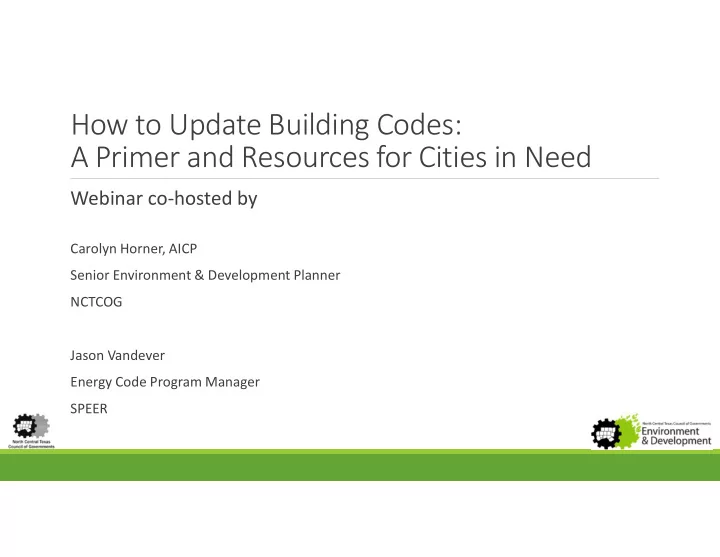

How to Update Building Codes: A Primer and Resources for Cities in Need Webinar co-hosted by Carolyn Horner, AICP Senior Environment & Development Planner NCTCOG Jason Vandever Energy Code Program Manager SPEER
NCTCOG Regional Building Codes Webpage https://www.nctcog.org/envir/regional-building-codes
NCTCOG Regional Building Codes Amendments https://www.nctcog.org/envir/regional-building-codes/amendments Building codes amendments are available going back to 2012.
NCTCOG Regional Building Codes Adoption Surveys https://www.nctcog.org/envir/regional-building-codes/code-adoption-surveys Map on building code adoptions in North Central Texas
NCTCOG Regional Building Codes Events and Training https://www.nctcog.org/envir/regional-building-codes/training Codes training calendar is updated as events become available.
NCTCOG Regional Building Codes Tools and Resources https://www.nctcog.org/envir/regional-building-codes/tools-and-resources The recently approved code adoption video is available now for viewing. This video is just over 2 minutes in length. We also have a program flier and an occupancy percentage table on the website. Other resources will be added to the website as they become available.
NCTCOG Regional Codes Coordinating Committee https://www.nctcog.org/envir/committees/regional-codes-coordinating-committee The committee structure, established by the Executive Board in 1967, is comprised of local government officials, architects, engineers, contractors, educators, property management professionals, insurance representatives, builders and developers.
NCTCOG Regional Codes Coordinating Committee https://www.nctcog.org/envir/committees/regional-codes-coordinating-committee This Committee provides guidance for several advisory boards that are designated to provide experts in various building science fields. Regional Codes Advisory Boards • Building & Residental • Electrical • Energy & Green • Fire • Plumbing & Mechanical
Contact Connect Carolyn Horner Senior Environment & Development Planner Facebook.com/nctcogenv chorner@nctcog.org 817.695.9217 @nctcogenv Tamara Cook Senior Program Manager Environment & Development nctcogenv tcook@nctcog.org 817.695.9221 youtube.com/user/nctcoged Edith Marvin Director of Environment & Development EMarvin@nctcog.org EandD@nctcog.org 817.695.9211 nctcog.org/envir
Code Adoption Assistance Corona-doo -> Edition An NCTCOG/SPEER Collaboration
SPEER • REEO – Regional Energy Efficiency Organization • Member-based non-profit organization • 50+ members from wide cross section of E.E. industries • Focused on Outreach Education and Collaboration on Clean Energy
Steps for Adoption 1. Identify current codes in State Law – NEC, IECC, ISPSC, Residential Fire Sprinkler, others 2. Review current ordinance: Is there a Construction Board or other protocol in place? 3. Engage stakeholders, create fact sheets etc. – optional 4. Draft new ordinance: Modification of existing, repeal and replace, amendments, other considerations, align with Zoning/Development 5. Council Hearing – follow proper notification protocol (effective date) 6. Notification & don’t forget to update website, forms, municode etc. 7. Follow up training and support as needed
For Example
Why Adopt Newer Codes? 1. State Law – TML Attorney Scott Houston, “…a city must adopt the code by ordinance to properly enforce it.” 2. Provides for better buildings and more 3. ISO rating 4. Creates consistency with other municipalities 5. The family of I-codes is meant to work in conjunction with each other – Chapter 11 of the IRC for example 6. Avoid liability/legal issues
Resources • Sample Ordinance • Other cities • ISO • ICC, ICC free codebook page • SPEER, Older SPEER page1, Page 2 • NCTCOG
Questions? Happy 4 th of July! Celebrate the birth of your nation by blowing up a small part of it Carolyn Horner - chorner@nctcog.org Jason Vandever - jvandever@eepartnership.org
Recommend
More recommend